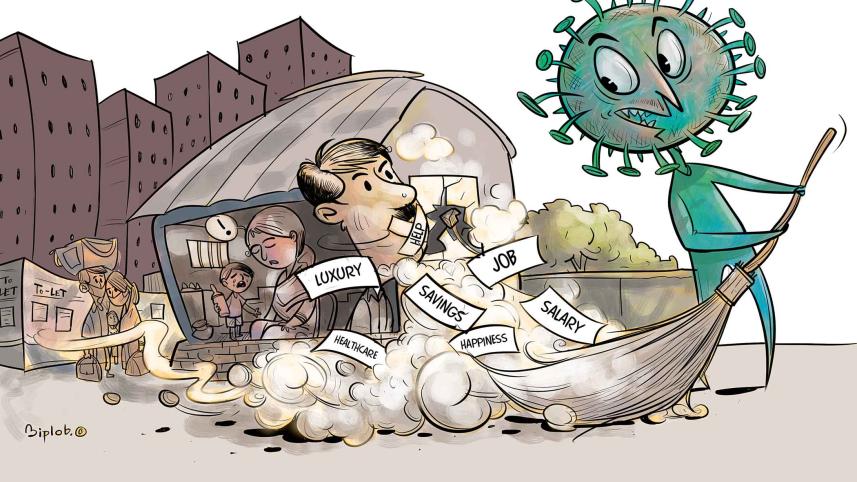No cushion for Middle Class

One story that went viral last month was that of Narayanganj's Farid Ahmed, who had called the national hotline seeking relief but was deemed "too rich" to get any government aid.
The upazila nirbahi officer took one look at Farid's clean-pressed clothes, his parental building of four storeys shared among seven siblings, and decided that he was attempting to swindle the government out of relief he was not entitled to.
Farid, who has a monthly salary of Tk 15,000, was asked to feed a hundred people for his "crime". He had to borrow Tk 65,000 to follow the order and avoid being sent to jail.
Humiliated and feeling like the rug was pulled out from beneath him, the man twice attempted to die by suicide.
It was a story that resonated across millions of households in an economy that saw the labour force shrink as the pandemic raged on into a second year.
But just like last year, this year too, the middle-class -- the class that's too rich to be poor, and financially stretched too thin to ever be rich -- has once again been left out of any budget considerations.
The proposed expansion of the social safety net programmes from Tk 95,574 crore to Tk 1,07,614 crore for the next fiscal year means little to a class which does not economically fall under the purview of "extreme poor".
For them, unemployment benefits are still a foreign concept even though there was a 49 percent decline in the income of salaried workers as per World Bank's figures.
The only form of unemployment benefits mentioned in the budget is the Tk 2,500 one-time direct cash transfer to the "selected poor families nationwide who faced sudden unemployment and income loss due to the pandemic".
When Soyeb Islam Shadhin, who works as a production manager for film sets, was unemployed for most of last year, he had to turn to his extended family for loans to survive.
He gets between Tk 1,200-2,000 for each day of shooting and lives in a one-bedroom apartment in Uttarkhan which he shares with his cousin.
"I had to spend months with no work and since I get paid per gig, I had no income coming in. But I had to stay in Dhaka instead of going back to my family in Naogaon in case I get work... and this is where work is," he said.
Last April, Centre for Policy Dialogue found that the stimulus package reached only 8 percent of the country's total employed population during the crisis period. This year too, the rural youth were targeted with microloans for setting up businesses, but there was nothing for professionals like Shadhin.
An expanded health insurance programme was rolled out this year with over 80,000 families receiving an insurance coverage of Tk 50,000 per year -- but that too is only for people living below the poverty line.
Having to seek treatment for Covid-19 remains one of the common financial blows incurred by many middle-class families. Earlier in the year, a study by Health Economics Unit (HEU) of the Health Ministry and the Department of Economics of Dhaka University found that the average out-of-pocket expenditure for healthcare can go up to Tk 5.09 lakh per head in private hospitals.
"One of the biggest problems we saw last year was the eviction of tenants who were unable to pay rent, and so this year we were demanding a tax exemption on small flats and loans," said Mohammed Komol Gazi, who represents an informal association known as Bharatiya Oikyo Parishad. "But there is nothing like that."
Even though the proposed budget announced the construction of around 70,000 new flats in Purbachal and Uttara-18 "to solve the housing problem in the Dhaka metropolitan area", the dream of those from the middle class to have a home of their own still remains as elusive as ever.
But even if there is no home in sight, home appliances for the dream home are going to be cheaper, with local production of washing machines, microwave ovens, electric ovens, blenders, juicers, mixers, grinders, electric kettles, rice cookers, multi cookers and pressure cookers all being exempted from Value Added Tax.




 For all latest news, follow The Daily Star's Google News channel.
For all latest news, follow The Daily Star's Google News channel.
Comments